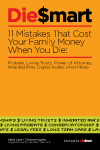The 2010 Congressional Budget Resolution recommends a personal estate tax exemption allowance of $3.5 million. The value of estates above that would be taxed at 45%. However, the language in the Budget Resolution does not provide for the “portability” of the $3.5 million allowance to a surviving spouse. Without “portability”, the proposed estate tax laws extend the existing married couple estate tax trap.
Existing estate tax rules
What is the existing married couple estate tax trap? Assume a husband and a wife each have property worth $2.5 million. The wife dies first and her will leaves $2.5 million of her assets to her surviving husband. When the husband dies, his estate now includes assets he owns and assets given him when his wife died. The estate tax value of the second spouse to die is $5 million. However, under existing tax laws, the second spouse to die can only claim his $3.5 million exemption. The estate would owe taxes on $1.5 million.
To avoid the married couple estate tax trap, many married couples spend time and money establishing an AB trust. The AB trust enables both couples to claim their $3.5 million tax exemption allowance, and exempts a total of $7 million from estate taxes.
Senate Bill 722
On March 26, 2009, Senator Max Baucus introduced the Taxpayer Certainty and Relief Act of 2009 (S. 722).
Senate Bill 722 provides “portability” of the estate-tax exemption allowance to the surviving spouse. Let’s take the same example. Assume a husband and a wife each have property worth $2.5 million. The wife dies first and her will leaves $2.5 million of assets to the surviving husband. When the husband dies, his estate now includes assets he owns and assets given him when his wife died. The estate tax value of the second spouse to die is $5 million. The “portability” of the estate tax exemption allowance would allow the surviving spouse to claim the $3.5 million exemption allowance available to the first spouse to die and his own $3.5 million exemption allowance.
The “portability” clause would exempt $7 million of the estate of a married couple from any taxation. The value of estates above $7 million would be taxed at 45%. This portability would eliminate the need for married couples to set up an AB trust in order for each couple to claim their individual estate tax exemption allowance.

